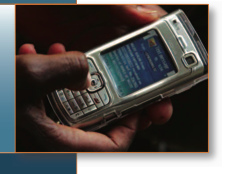poverty
Posted by KatrinVerclas on Jan 21, 2007
 Mobile banking is taking off, with the potential to change entire economies where the majority of people currently are currently "unbanked," as the term goes. There have been been several very interesting reports and articles recently on the topic. On the Foreign Policy blog, World bank consultant Christine Bowers writes about the enormous economic implications that mobile banking has for the world's poorest:
Mobile banking is taking off, with the potential to change entire economies where the majority of people currently are currently "unbanked," as the term goes. There have been been several very interesting reports and articles recently on the topic. On the Foreign Policy blog, World bank consultant Christine Bowers writes about the enormous economic implications that mobile banking has for the world's poorest:
Posted by PenelopeChester on Jun 29, 2010
Every four years, the world’s biggest sporting event captures the attention of football aficionados. The FIFA World Cup is more than just a soccer competition, though. For host countries such as South Africa, the tournament represents a chance to showcase the nation’s treasures, attract investments, and beguile tourists. For the creators of the 1Goal campaign, the World Cup offers a unique opportunity to develop the organization's largest-ever cause-related campaign. 1Goal, which is backed by FIFA, seeks to get every child into school by 2015.
1Goal was founded by the Global Campaign for Education (GCE), a coalition of more than 100 organizations from over 100 countries that has been coordinating advocacy, research and lobbying activities to end what GCE refers to as “the global education crisis.” The 1Goal campaign also benefits from serious star power, with co-chairs Queen Rania of Jordan, FIFA president Sepp Blatter and Archbishop Desmond Tutu lending their weight and global profile to the campaign.
Posted by AnneryanHeatwole on Sep 18, 2009
The ICT4D 2.0 Manifesto: Where Next for ICTs and International Development? data sheet 4137 Views
Abstract:
ICT4D – the application of information and communication technologies for international development – is moving to a new phase. This will require new technologies, new approaches to innovation and implementation, new intellectual perspectives and, above all, a new view of the world's poor. All these must be understood if we are to harness digital technologies in the service of some of our world's most pressing problems.
This paper explains the phase change – from "ICT4D 1.0" to "ICT4D 2.0" – and its implications. The background to these phases is reviewed, charting the logic and chronology of applying ICTs in developing countries. The implications of the phase change are then analysed.
First, in terms of new technology and application priorities. Then, in relation to new models of innovation we may need to embrace: from laboratory to collaborative to grassroots innovation. Next, in relation to new implementation models for funding, managing, and applying digital technology. Finally, the paper looks at necessary new worldviews to guide our thinking and our policies in this field; integrating perspectives from computer science, information systems and development studies. Additional commentaries and models provide a further set of rich insights into the future of ICT4D.
Posted by LeighJaschke on Jul 01, 2009
The Strategic use of mobile phone among poor people in some Latin American Countries data sheet 2554 Views
Abstract:
Mobile technology lets the users implement several strategies in order to minimize their spending. This paper documents the study of the determinants of the use of different strategies for a sample of users surveyed during May 2007 in developing countries as Argentina, Brazil, Colombia, Mexico, and Peru. This survey is focused in low income people and includes about 5500 people. The methodology used includes two steps. First, the study of the determinants of use of each strategy by means of a probabilistic model. It was found that educative level and age are important determinants of the use of the alternatives. Second, the use of a Poisson regression model to capture the intensity of use of these set of strategies. The findings differ among countries.
Posted by sharakarasic on Nov 01, 2008
On day three of MobileActive ’08, I attended a session led by Pragnya Alekal of the XPrize Foundation. Pragnya is a water sanitation and energy engineer who has spent a lot of time in the field. She stressed that technology has its limitations – it’s not the whole solution. Her entire goal has been to make up for the fact that technology is important while encompassing other factors.
Alekal told us that XPrize’s goal is to revolutionize sectors – they have a commons-based philosophy. Pragnya was at MobileActive ‘08 to get ideas. How do you solve poverty? How do you get more people to think of solutions?
Alekal told us the history of XPrize, which started with a big dream and got scaled out. It was founded by Peter Diamandes – from the age of nine on, he wanted to go to space. He became a rocket scientist and got six degrees. He felt that the astronaut program was too restrictive. If you are non-American like he is, your chances of becoming an astronaut are low. The number of people who make it into space is very small.
 Mobile banking is taking off, with the potential to change entire economies where the majority of people currently are currently "unbanked," as the term goes. There have been been several very interesting reports and articles recently on the topic. On the
Mobile banking is taking off, with the potential to change entire economies where the majority of people currently are currently "unbanked," as the term goes. There have been been several very interesting reports and articles recently on the topic. On the 